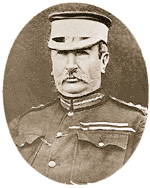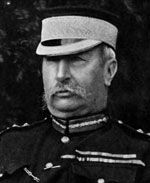Sir Redvers Buller


Engelsk general.
- Stormberg, 1899
- Colenso, 1899
- Ladysmith, 1899-1900
- Spion Kop, 1900
- Paardeberg, 1900
- Vaal Krantz, 1900
- Johannesburg, 1900
Buller, Sir Redvers Henry (1839-1908), engelsk general. Deltog i krigene mod Kina 1860, Ashanti 1874, kaffer og zuluer 1878-79 og Transvaal 1881; udmærkede sig i Ægypten 1882 og i Sudan 1884-85. Blev efter Wolseley generaladjudant for hæren 1890-97. Var i begyndelsen af Boerkrigen øverstbefalende i Sydafrika, men afløstes december 1899 af Lord Roberts og beholdt kun kommandoen i Natal, hvor han undsatte ladysmith 27. februar 1900 efter 4 måneders forløb, og 3 alvorlige nederlag ved Colenso, Spion Kop og Vaalkranz. 1901 fjernedes han fra Sydafrika og blev samme år afsat pga. en uforsigtig tale. (HK2/1920)
General Officer Commanding at Aldershot, October 1898 to October 1899 and January to October 1901
Commissioned into the 60th Rifles (King’s Royal Rifle Corps) in May 1858 he served in the Peking expedition of 1860, in the Red River Rebellion (Canada) 1870, and Ashanti (Ghana) 1873-4, where he came to the notice of General Garnet Wolsley. He then served in South Africa during the Kaffir War, 1878 and the Zulu War, 1879, where he commanded a regiment of irregular horse. Buller lost approximately ninety men of his force in the retreat from Inhlobane where he was awarded the Victoria Cross for rescuing three of his men from the Zulus.
He served as Chief of Staff in the first Boer War and then to General Wolsley in both the Egyptian campaign of 1882, where he was commended for coolness under fire at Tamai, and the Gordon relief expedition of 1885. He was employed as a civilian on police duties in Ireland in 1886 but returned to the Army as Quartermaster General and then Adjutant General for the next eleven years, from 1887 to 1897.
As GOC at Aldershot in 1899 Buller became commander of the Field Force for Natal during the South African War. Following a series of setbacks in South Africa, Lord Roberts replaced Buller. Notwithstanding that, Buller returned to a heroes welcome in Aldershot in January 1901.
A disagreement over policy led to his retirement in October 1901 and he died in Devon in June 1908, aged sixty-eight. He is remembered as the ‘father’ of the Army Service Corps (now incorporated in the Royal Logistics Corps). The Royal Logistics Corps barracks, in Aldershot, bear his name.